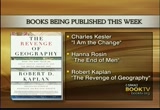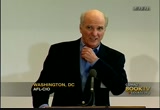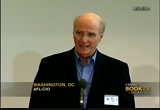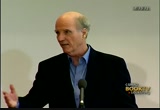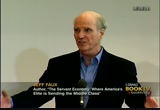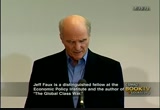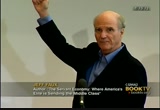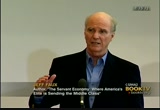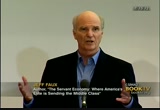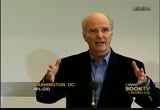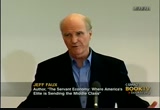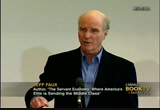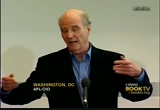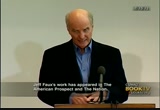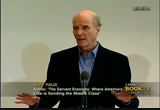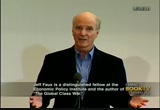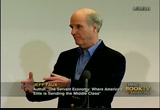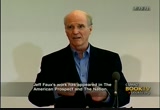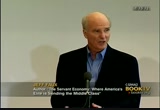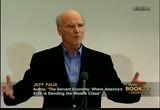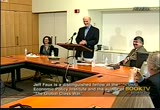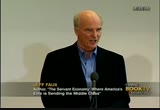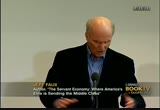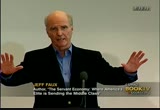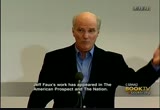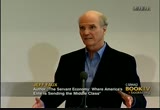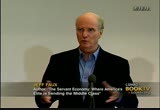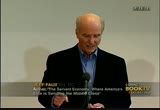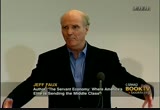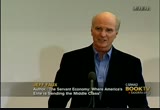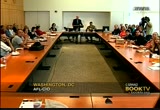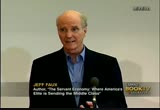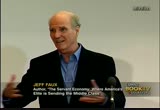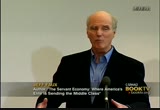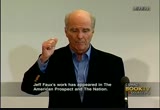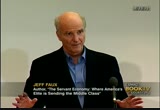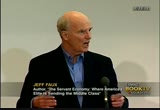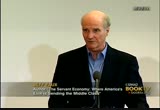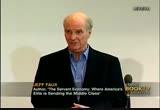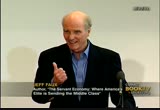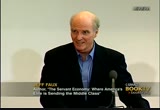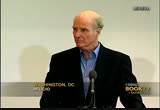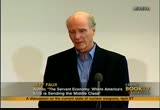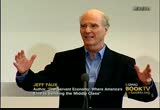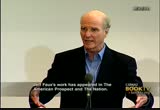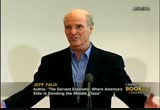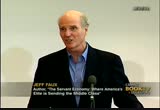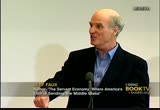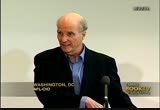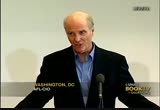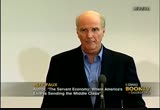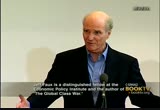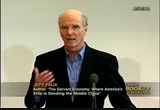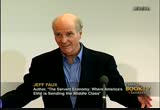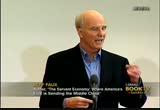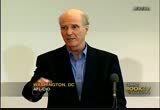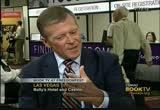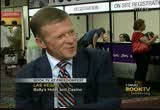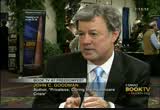tv Book TV CSPAN September 9, 2012 2:00pm-3:15pm EDT
2:01 pm
i urge you to come back. if you don't like what i say, come back next time anyway. if you do like what i say, come back. as rich says, he and i go back quite a way. i was just reminding him that -- we were money each other, the first time we met was at a cafe in boston with barry bluestone. rich was the head of the mine workers. we spent about three hours talking political ideas. we have not stopped really ever since. as a matter of fact, last summer when i was still in the middle
2:02 pm
of writing this book, i was telling ridge about it. and i was talking about the two-tier wage system. he said to me, to tears? why do you think they're going to stop the to. good point. and it is in the book. sobering, my book, the service economy, is about the future. not about the future of robots 100 years from now, and it's not about what's going to happen to the stock market to more. the future in this sense of this book is somewhere between ten, 12, 15 years now now, before i start i just want to make a little survey. how many people in this room think that the next generation is going to be financially worse off than the current generation? okay. put your hands down. how many people in this room
2:03 pm
think that they personally are going to be okay for the next ten or 15 years? the case. for whatever reason. okay. all right. okay. [laughter] the okay. well, actually, as i will explain a little bit later this is a very american audience. so, i'm going to talk about this in three stages. one, where the economy is headed , my view. to, what are the chances that that direction will be changed by our current political set up and what that means for activists and people who care about a better future for our country. there is more in the book, of course. tempers on history, chapters on the class system, the chapters on why the future disappeared from american politics.
2:04 pm
and then, of course, as you would all expect in an economics book, there is sex, romance, and adventure, but you're going to have to buy the book to get that now, start with this proposition. the united states for a variety of reasons no longer has the means to fulfill the three great dreams that have driven american politics will the last decade. one, the dream of business on wall street's for deregulation and infinite profits . two, the dream of our military and foreign-policy elites for global domination and three, the dream of the ordinary american for are rising living standard. now, one out of three. to add a three maybe. three of three, no way.
2:05 pm
now, you turn on the tv at night and read the newspapers in the morning. the pundits and politicians are talking about this grand bargain that must be made between liberals and conservatives, republicans and democrats about taxes, the budget. and it's all couched in the future of american. well, my first point here is that the bargain is already made the deal has already been struck that is of the three great dreams, the one that's going to go, the one that's going to go is the living standards of the american working middle-class. this is not, as rich said, just about the current recession. for those of you, you know that at the end of world war ii wages and benefits in the united
2:06 pm
states, real wages kept calling up year after year after year after year. we peaked about 1979 kaj and since then they have been flat. this doesn't mean that no one ever got a raise between 1979 and the crash of 2008. what it means is that take a typical worker, take a 30 year-old male worker with two years of college in 2008. the worker was making no more in real terms than is equivalent back in 1990 -- 1979. and by now we know why. globalization and a series of trade agreements which favored u.s. investors' overseas over american orders, the decline in the bargaining position of
2:07 pm
american workers union and nonunion and more recently the cuts and shredding of the social safety net. we know why this happened. there have been books including mine. but they're is a question that normal people laugh to this proposition. if ranges were flat and the economy was stalled for the middle-class, white it looks so get? why in the 80's and 90's, ups and downs, but people flocked to the balls, brought cars, houses to max kutcher. well, there are two main reasons for that. one is family income as opposed to our the wages kept up because families said more people to work. that strategy is now exhausted. more women now lever force the man
2:08 pm
. to the second reason, i'm sure you'll remember, the debt boom, the credit boom. so your wages are flat, you're not doing as much in terms of earnings is a parent's mind been , but you have access to easy credit. well, after the crash in 2008-9, that bubble is bursting. it will be at the most optimistic a generation before the public, the investors and everybody else forgets about what happened a few years ago and creates another kind of credible and that would lift the economy. it generation if ever. i argue in the book that i don't think it's ever coming back. so you have flat wages, but yeah flecks in family income.
2:09 pm
you can expect you're looking at a future of lower and lower wages and benefits. even with the recovery, want to stress that point. this is not just about the recession. even with the recovery, even with the recovery of jobs, we will create more jobs. already creating the nine now. they're paying 10-$12 an hour, not 20-2530. may be optimistic assumptions about the next ten years. no new recession. your present good down the to. no big banks fail. we continue to grow. make that assumption, and you still looking down the barrel of lower and lower wages.
2:10 pm
now talk about the decline. nobody knows the future. if you but is headed toward the rocks and there's going to be no change in direction it's a reasonable conclusion that were heading for disaster. that is part of when telling you. it's not inevitable. we know what we need to change this direction. people have been writing and talking about the high wage strategy for america for at least 20 years. we have all literature that explains how america can reverse its downturn. you know it. invested in the structure education and research. trade policies that encourage people to make things in the united states. if labor law reform, regulation of wall street, taxes that redistribute wealth, and it's a
2:11 pm
true national security strategy that is not dedicated to a global empire. having said that, ask yourself, what do you think of the chances of the things i just listed happening of the next four years , eight years, 12 years. just ask the question. and the democrats. have voted for obama last time and i will this time. banality other gatherings is the choice. the republican party has become an instrument of reactionary -- the worst kind of reactionary politics. it's not so much about bit runny
2:12 pm
whatever your judgment about whether he's good, bad, whenever . think about this. with the elimination of the liberal republican tradition within the republican party, the people that mitt romney is going to bring into the white house and in to the agency's are from a pool of reactionary activists. financial lunatics in some way. the current tax fight, they are defending tax cuts for the top 1%. just unbelievable. if you want to look into a future with a run the victory, that's it. i'm a democrat, but i did not it appeared it a lie the. i think, and i argue in my book
2:13 pm
will understand the central economic problem and propose investment programs and things of that sort. not nearly enough to solve the problem. republicans and looking. either way will we can see is a dour sloping curve for american living standards . i think the last four years just demonstrated that between wall street and a republican propaganda machine and house, whatever else you think about how the politics actually work, the next four years whatever happens, in terms of the issue of american living standards i think they're going to be
2:14 pm
roughly the same at best. after citizens united and the huge corporate contributions both republicans and democrats are more in the pocket of what a friend of mine in texas used to call big dollar and four years ago. again, and nothing is going to be an economic disaster or catastrophe, be an optimist. assume has all the mainstream pundits wanted, democrats and republicans make a deal on the budget, that there is no tax armageddon. budget cuts, reduced the deficit that is not going to stop wages from falling. so on our present course what do you think the world will look
2:15 pm
like in seniors well, we have that two-tier wage system that's going to become the three tier wage system we have shrinking organized labor. desperate state and local governments. why at think will street is going to own much of american education in another two years. it's going to be a world in which young people are urged to get a college, did into debt to mobile when it cannot with a half is ten, $12 an hour jobs. college graduates burden with that, working at apple, the best public get.
2:16 pm
temporary until i get myself back on some professional track. the 20 somethings are going to turn to 30 somethings. the 30 something's going to turn the 40 somethings. educated, still scrambling, temporary, part-time, and secure employment. that's what we're looking into the next decade. tensions between generations, not just over social security where you and people on low wages are going to start resenting, and god bless them they haven't so far, resenting their grandparents on social security. but on the job one of the greatest insights on the value of organized labor i ever got
2:17 pm
this back in the 1970's i was involved in an effort to revive the steel plant in ohio. i was talking to a retired steelworker. i said, jim, you know, tell me what it was like before the union and after the union, expecting him to say, you know, we get more wages, benefits, identification, health care. what he said, the fighting between the young and old stopped. he explained to me, you know, a steel mill is the -- requires a lot of skill. and before the union the old guy's never wanted to share the skills that being asked more? as soon as the nsc were stronger and all that learned the skill the boss with fire in the old guy. that security. and so he said when that changed
2:18 pm
suddenly people worked together. some people were happy to transfer their skills. so this is how you work with the molten steel model. think of to a world that no one has ever known in this room or will we take for granted will disappear. back to pre-new deal's human relations on the job. the boss, of course, we all know, always has the upper hand. says the new deal that has been restrained. loss camellias, protections. as they did deal the way in this age of austerity, this age in where our economic strategy is low wages. as they get to and away the speed of the faster, the
2:19 pm
cheating on paychecks gets more. the cut back on safety. why you think to stop at anything? recede improvise. people desperate for jobs, bosses and restraint, things we take for granted the will to go the bathroom with an asking your boss. that is what is a stake here. at this point in my talked to feel like a woody allen character in the movie who says to his congregation, brothers and sisters on the one hand we have a certain catastrophe in the other hand we have inevitable disaster. let us pray that we have the
2:20 pm
wisdom to choose. let me try to crawl of this. james baldwin, the great american writer said once or row once that not everything that is it based can be changed. nothing can be changed unless it is faced. that really was my message here, the message of the book. we have got to face what we're headed for. pace the gravity were headed for, face that there are no private solutions. now, like you, most americans think that while the country is headed downward in terms of the next generation they're going to deal can. this is traditional american optimism. actually, when people to the focus groups, push.
2:21 pm
this is america. hamel is going to be okay. well, they're not. they're not going have a majority of americans sitting on little islands of prosperity while the whole country goes down the time. that's not the attachment. as i say, with 20 somethings becoming 30 somethings and thirtysomething become 40 somethings, hope is not a strategy. and just electing democrats is not going to solve the problem. for those of your old enough to remember, bill clinton was the man from hope. barack obama had the audacity to hope. hope when you sort of peel away with the strategy is. that's what we're left with. the variety of reasons, the
2:22 pm
government is not calling to reverse this trend. so he the to the market. if you read the business really carefully you'll see some of these top stories might there is a facility that has come back from china. can you imagine? what am i talking about? with they don't tell you his those jobs is to pay $25 an hour another thing to of. so we're going to create jobs. the question is, can they support a middle-class living standards. i think about my formulation the answer is no. the embassy knows, president of ge which brought back the water here. head of the presence advisory
2:23 pm
council on exports. so make me stop of shoring. lory wages. that is the message. no, again, this is the strategy. now, if you have a conspiracy theory you can say it's by design. if you have a theory that most people in high places are not so smart, it's by default. but our economic strategy is to create jobs now by lowering wages. there will be no high-wage strategy in my opinion given the current political sub unless we start -- unless we not start, unless we get rid of the money coming from corporate america and our politics. if we do not do this all of the
2:24 pm
books of written before, of the things analysts have said, laying a we need to do, forget about it. it's just going to happen when big dollar continues to call. as you know it's out of control. no, it's not only about buying of the government, but it's also about discrediting government. at the same time that they buy it up to make sure it's not working for most of the people. a big surprise. people don't trust government. of course they don't trust government. now, of course, we know that we need government in order to solve the problems this country has. this, by the way, for those who did not get it, is a big country .
2:25 pm
therefore, we need big government. we're not coming to run this country with the government the size of honduras. and yet once in everybody's blob blob on the television the turnon, nobody trusts government. that's not a solution. so the have out when i started to write this book that i wasn't going to have a last chapter that said here by six points, hear my ten points, eight points. have been writing for 20 years. suddenly it dawned on me, people were not accepting my points. i have one point the into the book. and that point, i had -- likened the people in the dungeon. that point, which just happens to be something really believe,
2:26 pm
we need a national mobilization for a constitutional amendment to finally, finally get rid of one, the legal proposition that money equals free-speech and that corporations are people. unless we get rid of that, i can tell you, it's going to be slow. the decline is going to be slower and the democrats. a little bit more humane. it's going to be sharper, but that is where the cards are late , and that's where we're going unless we can make it change in the wake of and operates. the, believe a constitutional amendment is one where. a bullet -- i think that public financing really doesn't work anymore. i mean, we have the president's
2:27 pm
candid it's the blow them off. and the proposition that a solution to corruption in the government is for you, mr. and mrs. taxpayer can't play the rent and can hardly put for the table, to pay for you for the campaign's of people who are too corrupt to trust. that, i think, is a nonstarter. a constitutional amendment is too complicated? people don't care. it's true. this issue has been what they used to call a gugu issue, good government. who cares about the government. the liberal prossors. but we need, it seems to me, to connect to gatt's -- connect the dots. connect the dots for the american people between the way
2:28 pm
money dominates everything in our politics and their future. as long as big money calls the shots and it's getting bigger and bigger and bigger, the service economy that i described in this book is inevitable. again, the pundits are assessed with the grand bargain, liberals and conservatives. make a deal over taxes and make a deal of the budget. the deal is already been made. at least the first to dreams are going to be preserved and the price will be the crushing of middle-class dreams. subsequently this now with an anecdote that i have in the book. i was going to touch you too much because i want you to buy it. the story of the farmer.
2:29 pm
if you're raising pigs what happens is that the big pigs, when you put the feed in the trough, tend to go into the trough, cover the trough and eat the food. so the farmer has this problem. he asks his conservative son said to a conservative university. helmet and solve this? the conservative said, you know, the system with the world. social darwinism. you can't do anything about it. just keep being the big pigs in the little pigs and if they can't get the food of the night. that didn't seem like a good solution. invested. so ps sissonne. in liberal son says what you do is you just buy more and more feed, so much that it overflows the trough. the little pigs can get the big
2:30 pm
pigs can possibly eat. this is called trickle-down. the farmer said that will cost a lot of money. so in desperation he tends to his daughter but he did not send the college. he explains the problem who looks to many high and says, the answer is, get the page out of the trough. so my message is, and so we get the pace out of the trough, the service economy is our future. thank you. [applause] >> were going to do questions. anybody have some questions? a degree of a microphone somewhere. that doesn't help the people against the wall, but we have a microphone. please state your name. go ahead.
2:31 pm
[inaudible question] >> well, probably not. bion that time, although a been written about. it takes off mira the book. >> i was overseas. i kept expecting that when i would come home americans were finally going to be passed off and see the things that we'll talk about all the time. why aren't they passed off? what do you have to do is shake everybody got? >> listen. that's a big question. when everyone in this room has an opinion about. in my view many are passed off.
2:32 pm
and what they are not quite sure what they should be angry about. many get this stuff with each other. arrogance the tendency for the working class to fight each other is an old story in american history. so that's one thing. second, the propaganda from the right has really blown away the hope that you could do anything collectively. three democratic government to solve this problem. everybody knows how the systematically destroyed an idea . ever since ronald reagan, i have a thesis on this, the future has disappeared from american politics. then i was describing, that
2:33 pm
was apparent to a lot of people. there were proposals for economic planning for the future to revive, at that time even to 1979. people saw that manufacture was going down the tubes for an industrial policy. the idea of planning which probably you have not heard in a public discussion in two decades , the area planning to the future was something that was imbedded in the new deal. dams in the 1930's and the energy programs. they work about shaping the future. for a number of reasons we started to lose than the 70's, and then we completely lost it when reagan became president. jimmy carter, if you remember,
2:34 pm
at solar panels on the white house roof. carter tried to rally the country back in the late 1970's and the energy crisis. a lot of problems. some of the things he did, but he was dead right about this. if we get started on planning for our future back in the late 1970's we would be a whole lot and a helluva lot more end of the camera now. one other point on this. the future is just -- i mean, the past, our immediate past has been blurred out. like the old soviet union. they used to have the 12 leading guys and suddenly there are only 11. it's been published opt out of our recent past. back in the time of the bicentennial of this country, 1976, 200 years after 1776 there was a whole flurry of things around the country about
2:35 pm
planning the future. will we like our community to be light? this was 1976. and some of these things were just chamber of commerce boosters. some of it was above land planning. silva was about race and poverty , but it was a conversation that americans are starting to have as they can see the signals that things were not going quite right. this is the 1970's. energy crisis. staring us in the face. and this is not just among the grass roots left. big business people. this is just common sense. many to plan our future. when reagan was elected, the solar panels ripped of the white
2:36 pm
house. more importantly, photo showed the future out of -- was not going to be -- the future was not calling to be shipped by government, it was going to be determined by the market. that mind-set has been reinforced in reinforced in the echo chamber of our politics. so people are confused about that. they also don't understand. the doe and as -- they also don't see the importance of working together collectively. see, when the polls show was that the country is going to hell, but i'm going to be okay it tells you there's a disconnect. the connection was made by the new deal between the future, the
2:37 pm
collective future and you as an individual. well, that is gone. and so we end up with -- we end up just with frustration, just with esophagus and the distrust that government could possibly be the solution. yet this is where i come back to the money. 75 percent of the american people, reinforced, believe that money buys votes in congress. 81 percent of democrats and 71 percent of republicans. i mean, you know, you ask about these tea party people. did the government hands of one medicare. there is a confusion out there. i think, from one, my contribution to this is that i think people have to be forced
2:38 pm
to face querulous going. it's not just going to be okay. is not going to be elected is now. the scene the doing of cake. it's not a point to be like that. it's not coming to be to tears. is going to c-span.org in for. all the things that we have built up over the last seven decades, protections for people who have to work for a living, which is the majority of americans, they're going fast under the republicans, slower and the the democrats unless we change that. >> fairfax county. in 2008 it seemed eric cantor said that while this is a dire
2:39 pm
situation, all the opportunities that immersed from different kinds of situations. and so he and people like him. i'm just wondering, and your view, what is the opportunity for labor given the current climate? >> well, you know the badness. the good news is that -- will we for started bpi said, well, if all the labor needed was disappeared to mark the day after tomorrow we have to recreate the. so the problem is not pulling away. trade unions as the sole for of the problem will always be some more. you know, if you go to the history of the great depression it took quite a while for labor to come back. back in the early 1930's the
2:40 pm
afl-cio was losing some delight 500,000 members a month. it was just bleeding all-around. so the good news is that the problem won't go away. probably in some bizarre sense it will give workers. the second is the i think it a majority of the american people, if you look closely and all these polls and all of these things, they're not in the tea party. they're not blind to all this. they understand what social security desk. so that message has an audience. the problem is, and here's the hard part, and i may lose half the audience on this. here's the hard part. the problem is, we keep promising that if you just elect democrats this is going to be okay. re-elect democrats, things and not a cash and so what else to
2:41 pm
have? in a think we have to have something else. as i said, i'm going to vote for obama, but that is, man, if everybody in this room, if he wins and everybody spends the next three weeks after the rejoicing that we won, we have even more trouble than i thought so it's about -- and this is a cliche and the left, rihanna was true. it's about a people's movement. and i think, as strange as it may seem to some of the political consultants, i think that the money issue is a winner for us. and it teaches the lesson, the big money runs things. it's not -- it's not the left-wing -- the guy from the cato institute in the gas from the economic policy institute.
2:42 pm
what's running it is the money. people get it. he asks why congress is corrupt, what is it the correct congress? is not all campaign contributions. you can corrupt congress by promising a job after they leave . getting your kid and some private school, but nothing beats money for your campaign because if you don't elected and you don't have the good news to give out and you don't get the goodies. and it's simple. it's not hard. it's not like, here's my health care plan. it's get the money out of the pockets of the congressman. i think it works, and that even if it takes a while for it ever happen, it is a fantastic
2:43 pm
organizing device. we have to organize in every state. it's not sign an appearance in the letter to your congressman. organizing year to get the constitutional amendment passed. it boggles my mind, the last of five years except for the equal rights amendment there has been -- the right wing, they got a constitutional amendment on abortion, one on flag-burning , one on gay-rights, one on this, one on that. confidence on the right that the constitution is their document. that should be our confidence. >> i saw the tv presentations that he wrote about how i guess it was.
2:44 pm
[inaudible question] he wrote a document called the rose will socialists have wrecked the country. we have to take back. thus the underfunding. go across the street. 10:00 a.m., the national association of manufacturing into d.c. a firm grant and have to give from there to where they want to go back there is some money around it. the same time the people around the family, that the tune of something called a ldc, american legislative. [indiscernible] they do the same thing.
2:45 pm
so now we have the group's working here, attacking. they have money. the only thing i can say is, take away the money. they're still organized. >> taking away the money is knuckling to be easy. and i quote that memo which was to the chamber of commerce back in 1999. i mean, we know that they're organized. and so we have to out organize them. now, we're not going to outspend them. we are not going to outspend them. no way. if there was any dream that some how citizens united would make it equal for trade unions, you know, versus the big money, forget it. the evidence is quite clear. so, you know, for some people the idea is just, oh, my god.
2:46 pm
campaign about the constitutional amendment. it's just too hard. but room for the story about the drug under the streetlight. looking for the keys. the cop says, where did you lose them. over there. but you look there. the light is better year. yap. allied is better your. if we spend our time on this issue or that issue which is very important. but this is the word of it. [inaudible question] >> a talk. [laughter] let me particularly take you upon the idea of the future which i think reclaiming the future or constructing an idea of the future and using it as a means of political education,
2:47 pm
it's a great idea. among other things, the material. i'm struck by memory. in a bold enough to remember. the newsreels. when the united rail workers first campaigned to the union rights, when the gm management capitulated, poured out of the factory they had been occupying carrying american flags. that is to say they have an action as a progressive nation. and the interesting perversions of national tradition is the at the head that the united states is and is achieved. there is an account for that --
2:48 pm
i don't know what we call it, ritualized of session the form of an 18th-century constitution. different circumstances. so this seems to me that is to develop a notion of a common future, future we can all somehow work by. a feature that can take institutional form. you're quite right. it's -- knew have to read about it. somehow the at the drop that a side. some of the notions of liberty. but you're really on the track. a very much of bill continue. >> to where for my next book.
2:49 pm
the only quarrel i would have is the adjective long term. i don't think -- i think that too often is okay. going to do these things now. tomorrow never comes as the old saying goes. and as part of my book is about regaining the future, the idea of the future and why i stress now this negative path is to get people thinking about, what is the consequence of all this. and if the consequence, if now the props for off, make a statistical point, the props from family income, it is almost inevitable when it will go down unless a miracle happens. we can always tell. again, it's not a strategy. i think that bringing the future back to our rhetoric, what do you want your country to be like? twelve, 15 years from now.
2:50 pm
what to you want your family to be like. what do we want you to be like? where you going. identify with that which is embedded in america. that is in our psyche, and everything. instead of the false optimism. everything's going to be okay if we just camino. it's like people are waiting for the recovery. the recovery is here. this is what the recovery looks like. it's here. it's not, you know, this is it. somebody on the side. >> the steelworkers of. you did have the very coherent argument, i'm just wondering if we should talk a little bit about constraints. but said a constitutional amendment, what constraint for
2:51 pm
the global economy and what an opportunity as the global economy offer in terms of some of the alliances that the afl-cio has built up globally of the past 15 or 20 years for making this bill forward. when i spent thinking about this week is maybe for the third time in 100 years the fate of the world is in the hands of the democratic party. if you look at the precedents, it's not really encouraging. at think that the best you have, there is some optimism to be talked. >> a little bit. my last book, as you know. the importance of progressive movements, labor and others having connections across borders. if you have -- simply have a
2:52 pm
global economy. global corporations. you have to have some sort of global labor movement. so i think that's one. the second point is that on the pessimistic side, people in washington, the administration, libertarian, republicans, everything's going to be on the table in terms of this budget. military spending will be on the table. military spending is not plan to be on the table. the reason is, you don't have to go through the budget accounting to know this. is that going to be on the table because the policies that drive it of the policies of both parties. that is, the policies of having the added states still be a place of the world. the present program is to stay in the middle east. i don't know how much we have to
2:53 pm
go through. if you hang around in the middle east long enough is going to get into trouble and spend money getting into trouble. we are moving into latin america we have mexico which for 70 years did not take u.s. military aid. now it's taking u.s. military aid. against what outside enemy of mexico, guatemala, honduras, el salvador, no. its own people. we are dedicated, both parties are dedicated to keeping america the supreme force in the south china sea. now, i invite you to will it and look where it is. it's pretty close to china. and having an objective of
2:54 pm
maintaining american supremacy their is going to mean spending more and more money, even if we don't until war. so the third point is that i think, and let me make another pitch for this process about money in government. interconnected. i think one of the things that's true that we have not gone into people's heads is that the american corporate elite do not consider themselves american. that was my point in that last book. and so it's still in the minds of most voters. what romney says, you can't tax the people of the very top. then they'll go someplace else. they've gone someplace else. people have to get that to realize that. and depending on the market,
2:55 pm
depending on corporate america to deliver the goods in some ways the way they did neil days that to put it kindly, but for globalization, while management and labor more and sort points often there was classwork center both need each other. in the and general motors and needed the united autoworkers. henry ford said, that poster said it back in the early part of the last century. we'll raised wages by dollars an hour. $5 a day rather. the guys on wall street said, are you crazy? paying all that money. he said there doing the work.
2:56 pm
and then i have to have somebody to buy the cars. that's 1912. that's keynesian economics. he's absolutely right. but now when your market is the world, where your market is china you don't have to worry about raising wages and the united states, having people to buy your goods. would you care about is the consumers. it's a vastly different thing. vice-president of ford motor company of the senate. the senator says, representative of america's automobile industry. the vice president of ford says, senator, when a minute. ford is not an american corporation. when were in brazil were
2:57 pm
brazilian corporation. were in germany were adjourned corporation. and you all know that story. but that point was to be driven home. it's not about reversing globalization and someone. it's your stay. it's about either america has some meaning, economic meaning or it doesn't. and if it does it's about making sure that we are competitive enough and living standards a growing and that living standards are growing in mexico . a little bit of a diversion, but that chart, that upi chart with productivity continuing to grow and wages flat, the same charge is true of canada and the same chart is true of mexico.
2:58 pm
so there is plenty of room here for an expansive and inclusive politics. first we have to get the pigs out of the trough. >> talking to the microphone. [inaudible question] and a question about -- i'm wondering what your proposal for gated day. internal education. the late picture story. the constitutional amendment, what would that look like? >> people in this room if car
2:59 pm
who of us a professional organizers. it's like any other campaign. the idea is so simple. already have 75 percent of the people with you. it doesn't seem to want to me to have success, to have success with the people. what it means literally is that you have to create a campaign in all the states because of some point you have to put this through the state's. it's not going to happen. there are several bills in congress now. obviously getting beyond that, but it requires a very broad coalition of people to get the point. again, amelie is less, the
3:00 pm
afl-cio, even a member of the tea party. this is an issue for all americans. it is by its very nature inclusive. it's not like, you know, here is my program for me. many in politics, it's something that we all understand. how exactly work stated day, i don't know. by me lunch now working out on that can happen nine. [inaudible question]
3:02 pm
>> and your point about fairness is absolutely right. you know, over the last six, 12 months some of the mainstream punditry is discovered in the quality. you know but one the you know that america is not as equal as a used to be. all of that stuff. ppi is putting the stuff of the 25 years. now it's been discovered. that's good. but there are two things go wrong. you don't need class war. well, and the second thing is there is this continuous, the doctor not connected between the
3:03 pm
money that's not at the bottom in the money that top. the quality somehow is organic. it comes out of some on process. it's in the numbers. is that interesting. it is not an accident. and when politicians say and of course they're also afraid of being accused of being a class warrior, but when they say, i don't mind people getting as much money as they can to my being super rich. that's not my problem. that is one to tax them for what they got. i do mind. if there is that kind of inequality of the economic side you know there's going to be that kind of inequality and the political side. so it's not -- no, yes. inequality, little problem. maybe we could solve it with
3:04 pm
taxes. it is embedded in what's going on. the wages that are not being raised at the shop floor and all the productivity that's rising, that money is going somewhere. thank you very much. [applause] >> you're watching 48 hours of nonfiction authors and books on c-span2 book tv. >> tonight mark allen, up in name for a member of seal team six will recount the planning and execution of the rate described in his book no easy day, a firsthand account of the mission. the book was published by a division of penguin and released tuesday. it did do it number one in book sales on amazon with a print run of 575,000 copies. the author's account of the rate has not been well received by
3:05 pm
the pentagon which claims he violated an nondisclosure our agreement that he signed and that the book contains classified information. the authors lawyer stated in a letter to the defense department that his clients sought legal advice about his responsibilities before agreeing to publish his book and scrupulously reviewed the work to insure it did not disclose any material that would reach his ignorance or put his former comrades and risk. for more information about the story and of the book industry news visit our website booktv.org. >> this is the cover of john goodman's newest book. priceless, caring health care crisis. book tv is on location at freedom fest and las vegas. dr. john goodman joins us now to talk about priceless. but start by asking about the recent supreme court decision on the health care bill. what is your view?
3:06 pm
>> and starting to see that decision. i wish the court had thrown out obamacare and we could start over and have a more rational health care reform. now we're going to have to deal with the law as it is. i think, though, that even the supporters of the law are going to want to make major changes in it within the next year-and-a-half. >> okay. what do you want to see? what do you see as a rational health care? >> well we have in the obamacare law is a requirement that uni by an insurance grants for the system to grow at twice the rate of growth of our income. you don't have to be in the count to know that if your campaign for something that's going to a car and everything else are considering and eventually will add nothing to eat, nothing to wear, no place to live, lots of health care. that is the impossible plan. >> your group, the national center going to have one of the founders.
3:07 pm
>> that's right. >> what are those? >> to help savings account is an account people on the control and allows them to manage some of their own health care loss. most employers find that when they go to a high deductible plan and put the premium savings they kept the overall cost by as much as 30%. employees are happier did is they get to spend the money in the way they want to. >> hsh, how many people using hsh. >> 24 million people are managing their own money withheld savings account or something similar. >> what does the law say? >> the law is very restrictive. you have to have an across the board deductible. if you don't you can have one. i don't like that. at think the law should be flexible. most people in this country will have a health savings account. >> you also mentioned that with regard to our health care legislation that the supporters
3:08 pm
of the current health care bill will want to make changes. what are some of those changes? >> you have to give people the opportunity to choose to plan that has scaled down benefits. if you can't control costs in the other way people have to adjust to find a plan a going to buy. the obamacare legislation has very strange subsidies. the employees, ten, $15 an hour, they're going to have to have a family plan that costs $15,000. that's have their wages. the new law against no helper employees to find a plan. on the other hand, if the hotel abolishes its insurance plan and says all these employees over to a new exchange there going to get ten, $15,000 from the federal government. even if these businesses all of the country's debt restructuring as you workers lose jobs and at some point people will say there has to be a better way.
3:09 pm
>> your speaking here at freedom fest with the topic of your talk the message you want to get out. >> and talking about the book. and going to explain the title of the book. a double entendre. on the one hand your health care and the other hand, we're dealing with health care system that has no real crisis. none of us ever see a real crisis for anything, no doctor, no patient, no employer. that's the problem. you don't see real prices. the incentives. make cost hire. access more difficult. if we want to solve our health care problems we have to restore power to the patient and the doctor. >> have you requested, ever gone to the doctor and requested a price list? >> you can't find one. the only place you can see real prices is in those markets that insurance companies art. if you walk into a normal
3:10 pm
doctor's office they'll know what the cost of anything is. >> out of we get to where there is actual price list so we know what things are costing? how does that benefit the consumer? >> first have to empower the patient is in control of dollars . then you get an immediate response on the supply side and a doctor start competing on price and quality. you see that in cosmetic surgery,. ♪ surgery. and when you have that in all of sudden you find the real price of care is going down over time instead of going out. >> is there a government role? county uc the government and healthcare? do you see the government? >> one thing we have to do is take all the ways the government subsidizes, take all that money, give each of us the same amount of money to purchase health insurance, about $2,100 for an adult.
3:11 pm
that is your tax subsidy. if you spend additional money had after-tax is. treat everybody the same. >> with you mean? >> right now we don't. right now you get a message to the if you're an employer. you get no tax relief. if you purchase the insurance on their own under obamacare those inequities are even worse. step one was treat everybody the same. by insurance. no matter who you are, you can get the san on a tough from government. >> what about insurance companies. what is there will? >> right now they are just big bureaucracies, but in indeliberate it. we need real insurance. you will be held to insure to be the do that when you buy life insurance. buy life insurance, yet a prostate cancer test pretty dumb data -- youngbear higher premium
3:12 pm
health insurance to be the semi. >> people often compare health insurance policy to auto insurance policy. can they be the same or similar? >> i wish there were. on the casualty insurance ucb commercials on tv. if something bad happens were going to be there. in health care would be exactly the opposite. they don't want anybody with a problem. they run from them, and when you enroll in the plan they have an incentive to under provide you because they did not even the first place and wish you'd gone someplace else. we have given the insurance companies that incentives to take care of us. >> john goodman, when it comes to pre-existing conditions as the government have or will and sang, yes, you need to ensure preexisting conditions? >> yes, but you don't want to join the plan to pay a premium that is well below the cost of your care because then the insurance company is going to what you and is going to treat
3:13 pm
poorly. will we recommend is being able to insure an advance against preexisting conditions so that if you have to pay up higher premium you have insurance that can pay the higher premium but also many portable insurance. we don't have that today. you should on your own insurance. the bullet taken with different jobs out. >> the employer system, a time for it to not be the system? >> i believe in free markets, letting employers and employees to with pitches to do. let's have a level playing field. money to abolish those laws, a turnaround, and encourage portable insurance >> what is the argument in favor of having / states? >> i can't think of any. you ought to be able to buy
3:14 pm
insurance across state lines, life insurance across state lines. this is just silliness. the special interest who packed into your health insurance plan their special coverage is. >> priceless is the name of the book. a new book in 2012. john goodman is the author. this is book tv on c-span2. >> america has been patient. supported this president in good faith. today by the time has come to turn the page. today the time has come for us to put the disappointments of the last four years behind us, to put aside the divisiveness and the recriminations, to forget about what might have been and to look ahead to what can be. now is a time to restore the promise of america.
170 Views
IN COLLECTIONS
CSPAN2 Television Archive
Television Archive  Television Archive News Search Service
Television Archive News Search Service 
Uploaded by TV Archive on

 Live Music Archive
Live Music Archive Librivox Free Audio
Librivox Free Audio Metropolitan Museum
Metropolitan Museum Cleveland Museum of Art
Cleveland Museum of Art Internet Arcade
Internet Arcade Console Living Room
Console Living Room Books to Borrow
Books to Borrow Open Library
Open Library TV News
TV News Understanding 9/11
Understanding 9/11